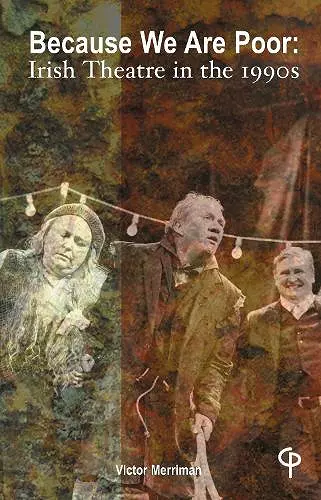Because We Are Poor
Irish Theatre in the 1990s
Format:Paperback
Publisher:Peter Lang International Academic Publishers
Published:18th Jan '19
Currently unavailable, and unfortunately no date known when it will be back

Throughout the twentieth century, Irish theatre was fully engaged with the pressing questions of independence - how to achieve it, and how the gap between what was desired and what was settled for might be addressed.
In Because We Are Poor, Victor Merriman reads Ireland's postcoloniality as a state of critical desire for a postponed project of decolonization in Independent Ireland. He develops insights from Awam Amkpa, Luke Gibbons, Peadar Kirby, Joe Lee, David Lloyd and others to argue that Irish theatre is staged in a neo-colonial social order, dominated by economic analyses and public policies designed to secure the position of indigenous elites, usually at the expense of the majority of Irish people.
Theatre emerges as a key site in which the contradictions arising from frustrated but enduring desires are embodied, enacted and enabled. During the 1990s, the state's monopoly on public discourse in Independent Ireland comes under severe pressure, with hitherto marginal concerns appropriating public space and demanding to be heard. Irish theatre responds to the range and diversity of those voices, to the extent that the Review of Theatre in Ireland (1995-1996) envisages a National Theatre in dialogue with a Theatre of the Nation.
The expanded theatrical activity of the 1990s is the focus of Because We Are Poor, and the author's intimate involvement in that moment, as scholar, practitioner, and policy-maker makes the analysis offered here especially compelling. This book brings together concerns which the author has worked to articulate in Irish theatre criticism.
It critiques contemporary appropriations of the postcolonial, or post-colonial, among scholars of Irish drama, and proposes a nuanced postcolonial critical practice, challenging critical vocabularies applied to Irish drama. The book addresses the role, crises and potential of Irish theatre, as the cultural and political consequences of globalization manifest themselves.
«Victor Merriman re-reads Ireland’s great traditions and its contemporary cultural practices with dazzling audacity and intellectual verve. His book offers stunning insights into transformative ideas about the nation, citizenship and cultural politics during Ireland’s recent economic boom, broadening and deepening our knowledge of postcolonial Ireland. Its account of the critical discourses that framed divergent narratives of the nation is eerily prescient. It proposes a decolonizing framework for understanding the neocolonial prosperity that underlay the ‹progress for all› mythology associated with the Celtic Tiger boom. In light of Ireland’s current economic collapse, this brilliantly argued book shows the way for a proactive cultural politics. The contemporary resonance and timeless fluency of Merriman’s arguments make this book a must read for those interested in Irish drama and theatre, and postcolonial theory.» (Awam Amkpa, Tisch School of the Arts, New York University)
«The Celtic Tiger may be now extinct, but those seeking an understanding of the cultural-political, rather than simply economic reasons for its demise need look no further than Merriman’s forensic analysis. Written with passionate conviction, it examines Irish drama of ‹the long 1990s› as the site which exposes the fault-lines in a society compromised by the willed failure of its own progressive promise. Drawing on canonical plays and productions, along with those from the social and cultural margins, this is a powerful testimony to criticism’s commitment to social change.» (Shaun Richards, Staffordshire University) «Victor Merriman’s work on Irish theatre is in the vanguard of a whole new paradigm in Irish theatre scholarship, one that is not content to contemplate monuments of past or present achievement, but for which the theatre is a lens that makes visible the hidden malaises in Irish society. That he has been able to do so by focusing on a period when so much else in Irish culture conspired to hide those problems is only testimony to the considerable power of his critical scrutiny.» (Chris Morash, NUI Maynooth)ISBN: 9781788748582
Dimensions: unknown
Weight: 398g
268 pages
New edition